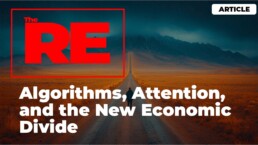The Ripple Effect
-News and Commentary-
Algorithms, Attention, and the New Economic Divide
- Home
- News and Commentary
- Algorithms, Attention, and the New Economic Divide
Share On Social

Today in The Ripple Effect, we are pulling back the curtain on the quiet power reshaping modern life. It is not politicians. It is not CEOs in corner offices. It is algorithms. Invisible, ever-evolving, they decide what you see, what you buy, who you connect with, and even how you think. And if attention is the new currency of this era, algorithms are the private banks controlling the flow. They are reshaping the economy, relationships, and personal opportunity itself, often without us realizing it.
The Birth of the Algorithm Economy
When the internet first opened to the public, it felt like a free marketplace of ideas. Websites competed for traffic. Forums built communities. Search engines tried to show you the best answer to your question. But as the internet scaled, the noise became deafening. Companies needed ways to filter, rank, and monetize information. Enter the algorithm, a set of instructions designed to predict and control user behavior at massive scale.
Early algorithms were simple. They ranked based on relevance, timeliness, or popularity. But over time, they evolved. They stopped just organizing information. They started shaping it. They learned not just what you clicked, but how long you lingered, what you hovered over, what made you emotional, angry, afraid, excited. The goal shifted from helping you find what you wanted to keeping you engaged for as long as possible, because engagement meant profit.
Attention became the product. Data became the raw material. Behavior became the currency.
Economic Winners and Losers
In this new ecosystem, not all creators, businesses, or individuals are treated equally. Algorithms reward content that triggers strong reactions. Outrage, controversy, spectacle, these travel faster and farther than nuance or thoughtfulness. Small businesses, artists, journalists, and independent thinkers find themselves trapped in a system where visibility depends on conforming to whatever the algorithm favors at any given moment.
Meanwhile, giant corporations and influencers with the resources to game the system, pay for ads, or manipulate metrics rise to the top. This creates a digital feudalism where a few mega-platforms and high-visibility accounts dominate attention, while everyone else fights for crumbs.
It is not a meritocracy. It is not a free market. It is an invisible hierarchy engineered by code you cannot see, written by people you did not elect, optimized for goals you did not choose.
Relationships Under Strain
It is not just businesses or creators feeling the pressure. Algorithms have quietly reshaped human relationships. Dating apps filter potential partners based on swipes and shallow preferences. Social media platforms prioritize posts that are likely to provoke reactions, even if those reactions are rooted in division or envy. Friendships get reduced to likes, comments, and birthday reminders. Political beliefs harden into echo chambers. Community bonds, which used to be based on geography, shared experiences, and real conversations, get replaced by algorithmic tribes.
The more you engage with a certain type of content or group, the more the algorithm feeds you the same, reinforcing your views, isolating you from other perspectives. It is easier than ever to connect, but harder than ever to connect meaningfully.


The Silent Economy
What makes this shift so dangerous is that it is largely invisible. You do not see the deals being made behind the scenes when a platform changes its algorithm. You do not see the way small businesses are wiped out because a tweak in Facebook’s feed ranking cuts their traffic by eighty percent overnight. You do not see the long tail of creators burning out because they have to produce ever more extreme content just to stay visible.
Traditional economies have regulations, oversight, debate. Algorithmic economies do not. They are proprietary, secretive, and global. A decision made in a boardroom in California can reshape political discourse in India, financial behavior in Brazil, or mental health trends in Nigeria. No borders. No warning. No accountability.
The Human Cost
The economic divide created by algorithms is not just about money. It is about opportunity. It determines who gets seen, who gets hired, who builds an audience, who gets funded, who finds community, and who gets ignored. For young people especially, growing up in this landscape means learning that success is not necessarily tied to skill, integrity, or hard work. It is tied to visibility. And visibility is tied to playing by rules you do not set and often cannot even understand.
Mental health suffers. Anxiety rises. Comparison becomes a daily ritual. Ambition gets warped into a constant hustle for attention, often at the expense of genuine learning, creativity, or connection.
Can We Take It Back
The good news is that awareness is rising. Movements for platform transparency, algorithmic accountability, and digital sovereignty are growing. More users are questioning how their feeds are curated, why certain voices are amplified, and whether constant engagement is worth the personal cost.
Some are turning to alternative platforms built on open source principles, decentralized networks, or chronological timelines. Others are reclaiming their time and attention by setting boundaries, curating their digital diets, and refusing to let algorithms dictate their emotional states.
It will not be easy. The platforms that profit from your attention have no incentive to change voluntarily. But every act of conscious engagement, every demand for transparency, every choice to prioritize real relationships over algorithmic ones, is a small rebellion against a system built on engineered addiction.
The Ripple Forward
The stakes are bigger than just personal well-being. In a world where algorithms control attention, and attention controls influence, the health of democracy itself is on the line. If we want an economy that rewards real value, a culture that fosters real connection, and a society that honors real truth, we have to wrestle power away from the invisible hands shaping our digital lives.
In the end, the most radical thing you can do in an attention economy is simple. Pay attention on purpose. Decide who and what is worth your time. Invest your focus like it is the rarest currency you own. Because it is.


